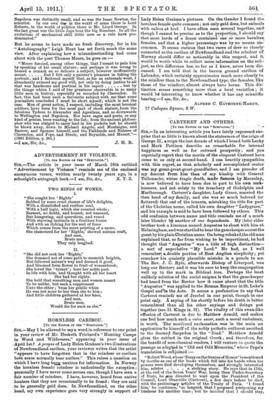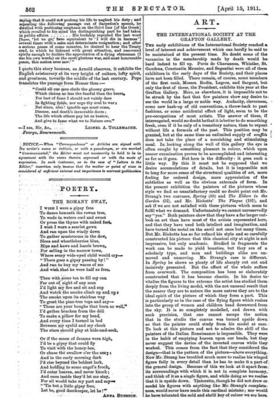CARTERET AND OTIIKII,S.
[To THE EDITOR OF THS " SPZCTATOR."]
Sig,—In an interesting article you have lately expressed stir- prise that so little is known about the statesmen of the reign of George IL, a reign the last decade of which I heard both Lecky and Mark Pattison describe as remarkable for internal happiness as well as for outward prosperity ; and you especially regret that the merits of the eloquent Carteret have come to us only at second-band. I can heartily sympathise with this regret, as that scholarly and accomplished' orator was my great-great-great-grandfather, and I am prouder of my descent from him than of my kinship with General Tollemache, whose tragic death, made famous by Macaulay, is now believed to have been due in part to his own reek- lessness, and not solely to the treachery of Godolphin and Marlborough. Carteret's daughter, Lady Grace, married the then head of my family, and she was so much beloved (or flattered) that on4 of the tenants, mistaking the title for part of the Christian name, called his own daughter " Ladygrace," and his example is said to have been followed by others. This odd confusion between name and title reminds me' of a much later blunder bi another of our dependents. My' (late) elder brother took a kinsman named Augustus to shoot with him at Helmingham,andwas startled to hear the gamekeeper accostthe guest by his plain Christian name. On being rebuke d,the old man explained that, so far from wishing to be impertinent, he had thought that " Augustus " was a title of high distinction— a sort of superlative "My Lord." He had, as I well remember; a.double portion of East Anglian simplicity ; yet somehow his quaintly plausible mistake is a pukzle to me. The Rev. J. C. Ryle, afterwards Bishop of Liverpool, was long our Rector; and it was his care to keep the congregation well up to the mark in Biblical lore. Perhaps the least unlikely solution-of the social enigma is that the gamekeeper had heard from the Rector how it came about that the title "Augustus " was applied to the Roman Emperor in St. Luke's Gospel andrin the Acts. It seems a profanation to say that Carteret reminds me of Jezebel in one point, though in one point only. A saying of his shortly before his death is better remembered than all his other sayings and doings put together (see II. Kings ix. 31). The vitality of this swan-like effusion of Carteret is due to Matthew Arnold, and makes one feel bow much such a rodeo eater, such a moral embalmer, is worth. The moribund exclamation was in the main an application'to himself of the nobly pathetic outburst ascribed to the doomed Sarpedon in the "Iliad." Matthew Arnold gives the extilact in the original Greek ; and therefore, for the benefit of non-classical readers, I will venture to quote the passage as adapted in " Old and Odd Memories," where Pope's translation is subjoined :- "Robert Wood, whose `Essay on the Genius of Homer' is mentioned by Goethe as one.of the books which fell into his hands when his powers were first developing themselves, and strongly interested him, relates Z. . a striking story. He' says that in 1762, at the end of the Years' War, being. then Under-Secretary of State, he Alas directed to wait upon the President of the Council, Lord Granville (Carteret), a few •days before he died, with the preliminyy articles of the Treaty ' of Paris. I found him,' he continues; so languid, that I proposed postponing my badness fdr Another time ; but he insisted that I should stay, dityr1ng that it could not prolong his life to neglect his duty ; and repeating the..followiag passage out of Sarpedon's speech„ he dwelled with particular emphasis on the third line [of the Greek] which recalled to his mind the distinguishing part he had taken in public affairs. . . ... His lordship repeated the last word Nosy, 'let us go,' bete equivalent to I will die in harness'] several times withs calm and determinate resignation; and after a serious, pause of some minutes, he desired to hear the Treaty read, to which he listened with great attention, and recovered spirits enough to declare the approbation of a dying statesman (I use his own words) on the most glorious war, and most honourable peace, this nation ever Saw: " I quote, this story because, as Arnold observes, it exhibits the English aristocracy at its very height of culture, lofty spirit, and greatness, towards the middle of the last century. Pope translates the passage from Homer thus :— "Could all our care elude the gloomy grave, Which claims no less the fearful than the brave, For lust of fame I should not vainly dare In fighting, Aelda, nor urge thy soul to war; But since, alas ! ignoble age must come, Disease, and death's inexorable doom ; • The life which others pay let us bestow, And give to fame what we to Nature owe?'
• Penryn, Bournemeittla.





































 Previous page
Previous page